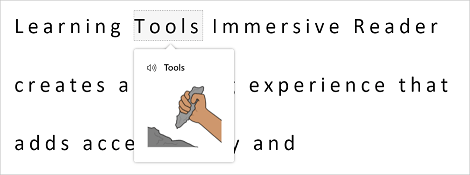Azure’s Immersive Reader is now generally available
Microsoft today announced that Immersive Reader, its service for developers who want to add text-to-speech and reading comprehension tools to their applications, is now generally available.
Immersive Reader, which is part of the Azure Cognitive Services suite of AI products, developers get access to a text-to-speech engine, but just as importantly, the service offers tools that help readers improve their reading comprehension, be that through displaying pictures over commonly used words or separating out syllables and parts of speech of a given sentence.
It also offers a distraction-free reading view, similar to what you will find in modern browsers. Indeed, if you use Microsoft's Edge browser, Immersive Reader is already included there as part of the distraction-free article view, together with its other accessibility features. Microsoft also bundled its translation service with Immersive Reader.

Image Credits: Microsoft
With today's launch, Microsoft is adding support for fifteen of its neural text-to-speech voices to the service, as well as five new languages (Odia, Kurdish (Northern), Kurdish (Central), Pashto and Dari) from its translation service. In total, Immersive Reader now supports 70 languages.
As Microsoft also announced today, the company has partnered with Code.org and SAFARI Montage to bring Immersive Reader to their learning solutions.
We're thrilled to partner with Microsoft to bring Immersive Reader to the Code.org community," said Hadi Partovi, Founder and CEO of Code.org. The inclusive capabilities of Immersive Reader to improve reading fluency and comprehension in learners of varied backgrounds, abilities, and learning styles directly aligns with our mission to ensure every student in every school has the opportunity to learn computer science."
Microsoft says it saw a 560% increase in use of Immersive Reader from February to May, likely because a lot of people were starting to look for new online education tools as the COVID-19 pandemic started. Today, more than 23 million people use it every month and Microsoft expects that number to go up once again in the fall, as the new school year starts.